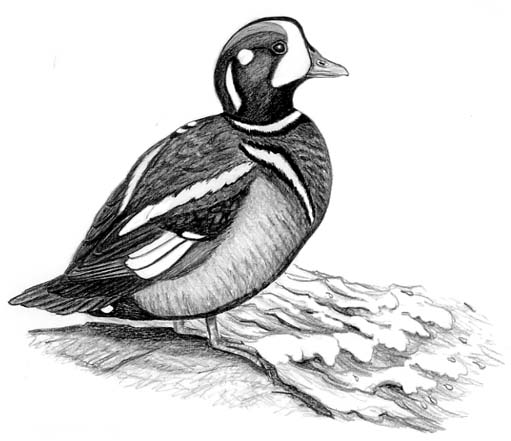
Dear Bird Folks,
I was in an art museum recently and I fell in love with a painting of a Harlequin Duck. Now I’m on a mission to see one. I asked the attendant at the museum if she knows where these ducks live, but she only stared at me with a puzzled look. Is there a chance I might find a Harlequin Duck in my area, and if so, when and where should I look?
-Karla, Pittsfield, MA
You sure are brave Karla,
No, Harlequin Ducks are not dangerous or anything. You are brave to actually speak to one of those museum attendants. I’m totally afraid of those people. They remind me of plaster mannequins, only with more dust on them. Remember Karla, you are not supposed to talk to strangers and they don’t come much stranger than those museum attendants.
I understand why a painting of a Harlequin Duck would turn you on. It is one striking creature. Every time I talk about an unusual looking bird, I suggest that everyone drop what they are doing and go check out a picture of one in their bird book. I’m sure nobody ever does it and I understand that. If I was reading something like this I probably wouldn’t do it either. But if you are ever going to run to look up a bird, this may be the time. The male harlequin’s body is a stunning mix of slate blue, deep chestnut, with bright white that is trimmed in rich black. You will not forget the first time you see a harlequin drake. The hen, on the other hand, has none of that. She is bland generic brown, looking more like an old shoe bobbing around in the water. Vegas won’t be calling her anytime soon.
We should not be fooled by the pretty-boy looks of this bird. Harlequins are one tough duck. You won’t ever find any harlequins hanging out in local parks quacking for bread like some other silly ducks we know. They don’t even like to swim in ponds or lakes. In fact, they avoid quiet water altogether. They like to be where the action is. Harlequins nest alongside fast running rivers and streams. The faster the water flows the better they like it.
Beneath the turbulent water is a food supply that few other creatures have access to. The harlequins simply dive right down and calmly snack on the hidden aquatic insects, while the water races all around them. These birds are so skilled in rough water that they will actually walk along the bottom in their search for food. That’s right, walk. The fish must be saying to each other, “Whoa, did anybody just see a duck walk by?” Ducks that walk underwater and talking fish are two of nature’s best kept secrets.
After the nesting season most ducks head south to escape the harshness of the coming winter, but not harlequins. They leave those turbulent inland streams and head straight for the nearest turbulent ocean. They migrate either east or west, whichever direction gets them to the closest ocean. I’m talking about a real rough rocky coastal area, not those quiet protected bays that other ducks look for. It is on these wintering grounds that most of us have a chance to see them.
Since wintering Harlequin Ducks are only found in salt water, Karla, there is very little chance that you will see one in Pittsfield, MA, except in the case of an extreme high tide. The best place for you to go to see these showy birds is Sachuest Point National Wildlife Refuge in Middletown, RI. Middletown is right next to Newport, so if you are also in the market for a new mansion, you can accomplish both tasks at the same time.
The entire eastern North American population of harlequins , if you don’t count that weird island of Greenland, is only about 1,000 birds, making it a very rare bird to see in most locations. But at Sachuest Point, you may see as many as 100 of them during the winter. It is very much worth the trip, even if it does mean you have to spend a day in Rhode Island.
In my area, Cape Cod, the best place to go is Nauset Beach in Orleans. Just north of the parking lot, only a short distance offshore, is an outcropping of rocks. It is among these rocks that a handful of wintering harlequins can usually be seen. However, you must keep the Orleans location a secret. Keeping it a secret is not for the bird’s sake. But if the town finds out that people want to visit Nauset Beach in the winter time, they’ll quickly run out and start charging for parking. That’s my town!